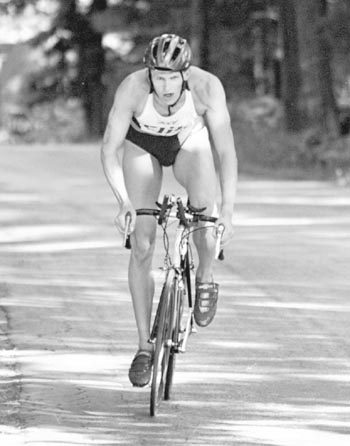|
Annual Triathlon Returns
 |
|
Democrat Photo by
Frank Rizzo
NO ONE NEAR HIM: Doug
Clark of Morristown, NJ, led the Highland Triathlon all the
way en route to a record-shattering win.
|
Clark Turns Highland
Triathlon Into Rout
By Frank Rizzo
YULAN — August 8, 2000 – Doug Clark of Morristown, NJ, nearly got a
speeding ticket en route to his first Highland Triathlon two years ago.
On Saturday, he reached 42 miles per hour in a 30 zone on his racing
bike, and breezed right past a stop sign.
Looking on were police officers on hand for traffic control as Clark
opened up a huge lead in the eighth annual tri-part competition,
sponsored by the IGA G-Mart and directed by Doug Stern of Yulan and New
York City.
Clark, 31, a software engineer for Lucent Technologies, set records in
the swim and bike portions and also the overall time as he easily won
his second Highland Triathlon on Saturday in the Town of Highland.
The eighty-five finishers first swam half a mile in Washington Lake in
Yulan, bicycled a hilly and arduous 14.2-mile course in the Township,
then finished up with a 4.1-mile run through the Timber Lakes Estates.
Clark’s overall time of 1:15:10 beat Mike Halstead’s record of
1:16:19, set in 1997.
On the women’s side, record holder Fiona Bayly of New York City
(1:27:31 in ’97) won for the second time in four years, clocking
1:30:24.
Clark was only four seconds ahead of Gregory Hagin when he emerged from
the waters. But it took Clark just 38 seconds to make the transition to
the bike, while Hagin was timed in a more leisurely 1:15. Then Clark
blazed the bike course in a record 37:40, averaging 23.9 mph and
reaching a peak of 47 mph on his $3,000 Elite bike.
A year ago Clark had a 4:43 lead at the start of the run, but was
caught by Chris Bergland with 50 yards left and lost by four seconds.
“My goal was to beat Paul Sklar’s bike record,” said Clark,
referring to Sklar’s 38:23 in ’97.
Sklar, a national biathlon champ, still holds the course record in the
run — 22:33.
Clark said this was his 10th triathlon of 2000. Earlier this year he
competed in the world championships, held in Australia. He placed 20th
in his age group.
Bad Luck
Former Russian national swim team member Irina Rijova was the first
woman to came out of Washington Lake, in 11:58, nearly a minute ahead
of NYC’s Fiona Bayly (who holds the course swim record of 11:55).
A short while later, Bayly bicycled past Rijova, of Brooklyn via Saint
Petersburg, Russia. Rijova’s bike had become disabled.
Bayly, riding her Quintanaroo racer (nicknamed “Beetle” after the
cartoon character) could relate to that kind of bad luck.
“Last year I fell from my bike and lost 40 seconds,” she said.
Bayly, 33, had been on the 6-foot-2 Rijova’s heels in Washington Lake
when she got hit in the face.
“I must have inhaled a gallon of horrible tasting water,” Bayly
laughed.
Rijova, 26, said she looked forward to competing in the Highland
Triathlon next year.
The Locals
After getting edged by Bloomingburg’s Bill Norton last year,
Barryville’s William Schneider had one aim in his eighth Highland
Triathlon: “I was trying to get my place back, to be first in the
county,” said Schneider, 43, a machinist at Port Jervis Machine Shop
said.
Thanks to personal bests in the swim, bike, and overall, Schneider
placed 13th (his best finish ever), and his 1:31:18 beat out Norton by
over two minutes.
“I had won five years in a row, then lost out to Bill by seconds last
year,” Schneider said.
Schneider has not missed a single Highland Triathlon, but noted that
his family comes before his training.
At his weekly peak, he runs 15 miles, bicycles 75 (“mainly short
stuff, working on my speed,” he said) and swims three miles on the
relatively flat and calm Delaware River in Barryville.
Adam Cole of Eldred, a 1998 graduate of Eldred CS, wound up using a
mountain bike instead of his racing bike — which broke the night
before the race.
Cole placed 36th overall.
“I haven’t been on a bike in over a year,” he said.
Cole is stationed at the Fort Lewis army base near Tacoma, Washington.
Aside from the heavier bike he had to use, Cole said the toughest thing
for him about the Triathlon was the transition from biking to running.
“After riding 15 miles your legs feel like jello,” he noted, adding
that different muscles are used in the two events. “It takes me about
one and a half miles to get acclimated to running.”
This was Cole’s third Triathlon.
Stern thanked the many volunteers who helped smooth the race’s
progress, and gave note to the county’s Department of Public Works,
which paved large portions of the roads used in the race and provided
signs for the bike course.
|

